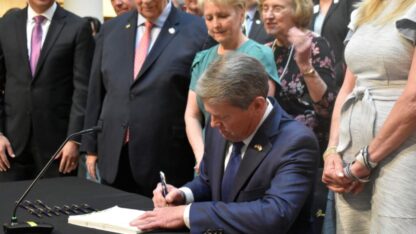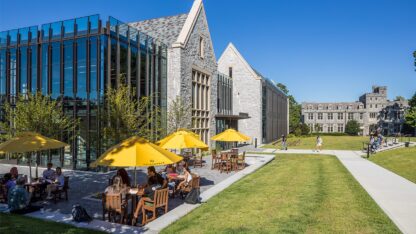The 988 Suicide and Crisis Lifeline received over 1.7 million calls, texts and chats in its first five months. That’s nearly half a million more than the old 10-digit Suicide Prevention Lifeline fielded during the same period the year before.
Launched in mid-July last year, the 988 number is modeled on the 911 system and is designed to be a memorable and quick number that connects people who are suicidal or in any other mental health crisis to a trained mental health professional.
“We see the uptick in volume as an indicator that more people are aware of the service and are able to access it,” says Kimberly Williams, the president and CEO of Vibrant Emotional Health, the non-profit that oversees the national 988 network of nearly 200 crisis centers spread across the nation.
More people getting connected to help, faster
Not only are more people reaching out, more are being connected to help.
Federal data shows that the Lifeline responded to 154,585 more contacts – including calls, text messages and chats – in November 2022 than the same month the year before. The number of abandoned calls fell from 18% in November 2021 to 12% last November.
The average wait time to speak to a counselor also fell – from close to 3 minutes in November 2021, to 36 seconds last November.
“So more people are being connected to those trained counselors and they’re being connected more quickly to the life-saving services that are available,” says Dr. John Palmieri, a psychiatrist overseeing the 988 launch for the Substance Abuse and Mental Health Administration.
And the biggest rise in recent months has been in the number of people connecting to the Lifeline via texts and chats.
“We know that texts and chat are modes of communication that are preferred by younger callers, younger people in crisis, and that those younger people in crisis tend to be in more acute stages of distress,” says Palmieri.
And so, responding quickly is even more important with this population, he adds.
Culturally sensitive counselors
The 988 Lifeline is also trying to improve access to crisis care for people in marginalized communities.
Last September, it launched a pilot program to allow people to connect with a counselor specifically trained to address issues faced by LGBTQ youth, says Williams of Vibrant Emotional Health. Those services are being provided by the Trevor Project, the leading suicide prevention organization for LGBTQ youth.
Additional funding approved in the most recent federal spending bill “is going to allow us to create a formal and permanent sub-network from this pilot,” adds Williams.
In November, the state of Washington launched the Native and Strong Lifeline, the first suicide crisis line for American Indian and Alaska Natives in the state, as part of the national 988 network. People dialing 988 in the state can choose to speak to Native crisis counselors, who “are trained in crisis intervention support, with particular emphasis on cultural and traditional practices related to healing,” notes Williams.
And more people of color are beginning to reach out to the 988 Suicide and Crisis Lifeline, says Natalie Gutierrez, an author and therapist in New York, who treats intergenerational trauma and complex post-traumatic stress.
“I’m appreciative that there is a space that you can reach out to 24/7 for everyone, and especially marginalized communities that even struggle sometimes even talking with other people face-to-face about just what they’re holding and the pain that they’re carrying,” Gutierrez says. “I think we’re getting a lot more people using these helplines, using these crisis lines, because folks are really trying to move away from these stigmas.”
“The fact that you can be anonymous, and call in and you can have these conversations is really, really important,” says Timothy Jansen, CEO of Crisis Community Services Inc, in Hyattsville, MD, which is part of the 988 network and has served as a regional backup center for Vibrant Emotional Health.
Diversifying the workforce at his crisis center has helped make in-roads into marginalized communities, he adds. “The fact that you’re calling in and the folks that are answering the phone are just like you” makes a difference.
Later this year, the 988 Lifeline will start offering video chatting options.
“With this option, people who are deaf or hard of hearing, experiencing distress or mental health concerns can use their videophone enabled device to call the 988 Lifeline,” says Williams.
Recent funding has boosted network capacity
So far, the data suggest that “the investments that have been made in the system really have made a difference with respect to the performance overall of the network,” says SAMHSA’s Palmieri.
The federal government has invested close to $1 billion into the 988 Lifeline, including a little more than $500 million in the federal spending bill. And many states have passed legislation to fund the 988 network.
The money also supports the Spanish-language network, Williams adds, as well as backup call centers which help respond to callers who can’t get through to smaller call centers near them.
It’s the first time that local 988 crisis centers have received significant federal funding, says Jansen.
The money has also allowed him to nearly quadruple his workforce.
“We probably had roughly 75 or 80 folks that worked the phones and chat,” he says. “And now we’re up to a little over 300.”
He’s also been able to expand his training team, hire more supervisors and data experts, so the center can also improve the quality of care that counselors provide.
But, he notes, not all crisis centers across the country have been growing as his has.
“Lots of centers are really struggling to get folks hired,” says Jansen. “You know, it doesn’t pay a million dollars. The work can be hard. There’s secondary and tertiary trauma related to listening to calls, you know, or even doing chats.”
And monthly data from the national 988 network reflects the tremendous state-to-state variability in how the network is performing.
In Maryland, where Jansen works, 89% of contacts were connected to a counselor in November 2022. In Texas, it was only 63%.
That’s partly because many states have yet to invest money into their local crisis call centers and associated services.
According to analysis by the National Alliance for Mental Illness, only five states have passed legislation to fund 988 with a small fee to people’s cell phone bills – much like the 911 fee people already pay. And only 16 states have created a trust fund to permanently fund 988 and related crisis services.
Other mental health care services
Despite the recent boost in the network’s performance, 988 counselors can only do so much to help people with ongoing mental health needs.
“There’s a significant shortage of social workers and mental health professionals that people can see,” Jansen says. “And so people wind up at places that have long waiting lists.”
There’s also a shortage of other crisis-related services, says Williams, like mobile crisis teams that support people in their homes and communities, and crisis stabilization units – sort of like mental health urgent care – that can support people outside of a hospital setting.
“Many communities don’t have this range of services available to support people,” she says.
“States need to be investing long-term, ongoing resources in building out mental health crisis services that people need when they’re experiencing emotional distress.”
But she, and other mental health care advocates remain hopeful that now that 988 is up and running, and reaching more people, states will eventually start to invest in other parts of the mental health care system.
Copyright 2023 NPR. To see more, visit https://www.npr.org.
9(MDAxODM0MDY4MDEyMTY4NDA3MzI3YjkzMw004))

9(MDAxODM0MDY4MDEyMTY4NDA3MzI3YjkzMw004))








